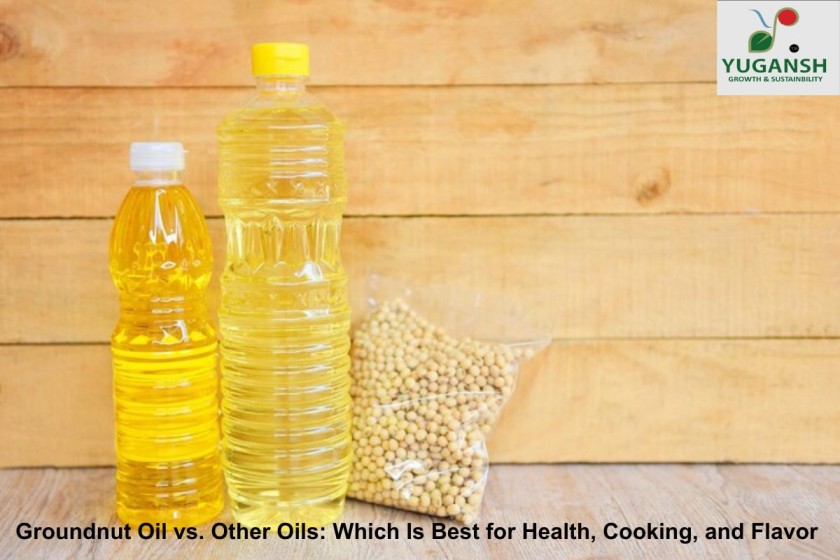There are many options when it comes to choosing the right oil for cooking purposes. Among the most popular options, there is olive, coconut, and groundnut oil each with different qualities consumers should be aware of. In this guide, we’ve compiled a comparison between the three oils, based on health benefits, cooking uses, and flavour.
Health Benefits
Groundnut oil, also known as peanut oil, is rich in good fats. It is saturated with monounsaturated and polyunsaturated fats, which helps to encourage healthy hearts by reducing the levels of bad cholesterol. Groundnut oil that is cold-pressed is saturated with antioxidant vitamin E.
Olive oil is usually light healthy oil. Similar to groundnut oil, it is rich in monounsaturated fats which enhance the heart. The frying process does not ruin the anti-inflammatory action of this oil; its anti-inflammatory action can help bring down inflammation. Rich in antioxidants and also good skin health.
Coconut oil contains saturated fats at a very high level. Although it increases good cholesterol, it is thought that coconut oil increases bad cholesterol. However, it helps the digestion system and improves immunity.
Mustard oil, primarily kachi ghani mustard oil, is very healthy. It is sharp in taste and carries a reasonable share of monounsaturated fats. Apart from these attributes, it is also said to be antibacterial as well as antifungal.
Two other cold-pressed oils are very commonly used and also comprise sesame oil and sunflower oil. Both contain high levels of antioxidants, and they are useful in reducing the level of bad cholesterol. They eventually benefit the health of the heart. Therefore, they are a good choice to use while cooking.
Cooking Uses
When choosing an oil, the smoke point is usually another important consideration. In simple terms, different oils can take a different amount of heat before burning or smoking as they reach their smoke point.
Groundnut oil smokes at a high temperature and it is thus best for frying. It does not easily burn at such high temperatures when using it for deep frying or stir-frying. This aspect gives groundnut oil great versatility in cooking.
Olive oil, especially extra virgin olive oil, is suited for low-heat cooking. It is very ideal for salads, salad dressings, and light sautéing. But it’s not so ideal for deep frying because it’s low smoke point.
Coconut oil is perfect for baking and middle-range heating. At room temperature, it’s in the solid form, making it also good for spreading. This oil brings rich flavour to desserts and dishes which have been briefly sautéed.
Mustard oil is ideal for Indian cooking, especially in pickles and curries. This oil has been known to have a sharp, pungent taste and is put to use in tempering and frying. It should first be heated properly to remove its natural toxins.
Cold-pressed sesame oil would particularly suit medium-heat cooking. This is commonly used in most Asian dishes and salad dressings. Just like groundnut oil, cold pressed sunflower oil has a very high smoke point, therefore ideal for frying, roasting, and stir-frying.
Flavour
Oil can add flavour to a dish. Oils add very neutral flavours and some strong flavours or profiles.
Groundnut oil has that mild nutty flavour but does not overpower food and is versatile enough for all sorts of dishes, whether used in stir-fries, baked goods, or fried items, which leaves subtle richness.
Olive oil has a distinct, fruity flavour, particularly with extra virgin olive oil. It goes well with Southern dishes, salads, or dips. It tends to intensify the flavour of vegetables and bread.
Coconut oil has a flavour like sweet tropical fruit. Its strong flavour is rather good for baking since it contributes a unique flavour to cakes and cookies. However, it might not be used in savoury dishes unless you enjoy a coconut flavour.
The flavour of mustard oil is very sharp, strong and aromatic. Mostly, this oil is used in Indian and Bengali cooking. It imparts a bit of spice to food to carry with it. However, for people, it is likely too strong to use often.
Cold-pressed sesame oil is full-bodied and nutty, a dominant flavour that is often used in Asian cooking. It pairs particularly well with soy sauce, ginger, and garlic. Cold-pressed sunflower oil has a light, neutral flavour. You want it if you are making dishes in which you do not want the flavour of the oil to dominate.
Other Considerations: Cold Pressed and Wood Pressed Oils
The method of extracting oil can affect the quality and the health benefits of the oil. Cold-pressed oils include cold-pressed groundnut oil and cold-pressed sesame oil. Cold-pressing production uses minimal heat in the making. Therefore, there are more nutrients and antioxidants retained than in the refined oils. It is also known for offering a fresher taste and with less processing.
This method is known as wood-pressed oil, another method of traditional oil extraction. It is just cold-pressed which uses wooden machinery; thus, it helps to preserve the natural flavour and nutrition of the oil.
Conclusion
Based on health objectives and the requirements, the choice of the right oil for you is very important. Cold-pressed groundnut oil can be used for frying as well as general cooking, which is very healthy. Olive oil is a great choice for light cooking as well as salad dressings. Coconut oil is excellent for baking, and mustard oil is for those dishes that are spicy and flavoured. Other really good cold-pressed sesame oil and cold-pressed sunflower oil also offer you various health benefits.
Knowing these differences can help you decide on the best oil to take home for your kitchen.


